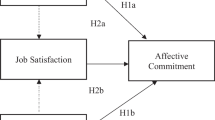Abstract
This study identified supportive supervision, co-worker social support, and job awareness as three factors that affect job satisfaction of employees from two mid-sized Japanese manufacturing companies. In addition to the significant main effects of supportive supervision and co-worker social support, a significant interaction effect between supportive supervision and job awareness was obtained. This interaction suggests that supportive supervision is very important in increasing job satisfaction when workers have low levels of job awareness.
Similar content being viewed by others

References
Cobb, S. (1976). Social support as moderators of life stress.Psychometric Medicine, 38, 300–314.
Cobb, S. & Casl, S.V. (1977).Termination: The consequences of the job loss (NIOSH Research Report, DHEW Publication No. 77-224.) Washington, D.C.: U.S. Government Printing Office.
Even, R.B. (1967). Weighting components of job satisfaction.Journal of Applied Psychology, 51, 68–73.
Ferratt, J.W. (1981). Overall job satisfaction: Is it a linear function of facet satisfaction?Human Relations, 34, 463–473.
Galbraith, J., & Cummings, L.L. (1967). An empirical investigation of the motivational determinants of task performance: Further active effects between instrumentalityvalence and motivation of human performance.Organizational Behavior and Human Performance, 2, 237–257.
Howard, A., Shudo, K., & Umeshima, M. (1983). Motivation and values among Japanese and American managers.Personnel Psychology, 36, 883–899.
Moffitt, W., Weed, S.E., and Mitchell, T.R. (1976). Leadership style, subordinate personality and task type as predictors of performance and satisfaction with supervision.Journal of Applied Psychology, 61(1), 58–66.
Pinneau, S.R. (1976). Effects of social support on psychological and physiological strains.Dissertation Abstracts International, 10, 5359B.
Rocco, J.M.La., and Jones, A.P. (1978). Co-worker and leader support as moderators of strain-stress relationship in work situations.Journal of Applied Psychology, 63(5), 623–634.
Scarpello, V., and Campbell, J.P. (1983). Job Satisfaction: Are all parts there?Personnel Psychology, 36, 577–600.
Statistical Analysis System package. SAS Institute Inc., North Carolina, 25711.
Stogdill, R.M. (1972a). Group productivity, drive and cohesiveness.Organizational Behavior and Human Performance, 8, 26–43.
Stogdill, R.M. (1974b).The Handbook of Leadership: A Survey of Theory and Research. New York, Free Press, 404.
Taylor, J.C., and Bowers, D.G. (1972).Survey of Organizations. Ann Arbor: Institute for Social Research.
Thierry, H., and Koopman-Ewema, A.M. (1984). Motivation and satisfaction.Handbook of Work and Organizational Psychology, 134–174.
Vroom, V.H. (1964).Work and Motivation. New York: Wiley.
Wanous, J.P., and Lawler, E.E. (1972). The measurement and meaning of job satisfaction.Journal of Applied Psychology, 56, 95–105.
Author information
Authors and Affiliations
Additional information
We appreciate the comments and assistance of Professor Y. Hara, Associate Professor M. Yano, S. Kobayashi, J. Nukata, and two anonymous reviewers for their valuable recommendations on the earlier version of the article.
Rights and permissions
About this article
Cite this article
Kumara, U.A., Koichi, F. Employee satisfaction and job climate: An empirical study of Japanese manufacturing employees. J Bus Psychol 3, 315–329 (1989). https://doi.org/10.1007/BF01023049
Issue Date:
DOI: https://doi.org/10.1007/BF01023049



